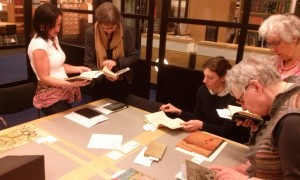During another inspiring meeting with our volunteers for the Dutch HERA TTT exhibition, we made a very exciting trip to the Bijzondere Collecties (Rare Collections) at the National Library of the Netherlands (KB) in The Hague. Apart from the simple joy of looking at beautiful books written by ‘our’ women writers we planned this visit because we wanted to make a first selection of material for the exhibition.
Photo: Arno Kuipers
Intern Remco Bloem prepared the session and ordered a great selection of rare old books from the 19th century which were waiting for us in a special room. Amongst those were Vroolijke Japanneesjes, an amazing picture book (translated from the English) by Tine van Berken (which will definitely be present at the exhibition) and the touching, beautifully illustrated story about a dog Hector: geschiedenis van een hond by Anna van Gogh-Kaulbach (another yes!). Other great works on the table were a collection of fairy tales by Augusta de Wit and Johanna van Woude’s Tom en ik (Tom and I) and its translation in English (by an man: Roger Action): A young wife’s ordeal . And what a treat to be able to look through an 18th century copy of Belle van Zuylen’s Le Noble, which contained handwritten notes by her first biographer Philippe Godet.
Collection specialist Dutch language and literature Arno Kuipers taught us how to handle fragile old copies (pick them up, don’t let them scrape the table) and elaborated on the uselessness of those gloves we all had secretly hoped to be an obligatory component of paging through old books. Turns out that the use of gloves is complete gibberish! As Kuipers explained, fingers do not ruin paper while a gloved hand actually might. Such a ‘protective measure’ in actual fact makes us less sensitive to touch and therefore increases our clumsiness a great deal.
Next, Kuipers taught us about the ever growing collection of the National Library. New books arrive on a daily basis. In fact, the collection expands so rapidly that the underground storage space has been used up. More room has been found in a high building close by. Although this seemed like good news to us, Kuipers told us that not everybody gets excited when yet another lorry full of books shows up at the entrance. He explained how the process of getting each book looked at and catalogued is extremely time consuming. All books go into quarantine first, where they are examined on silverfish and other enemies of our beloved paper treasures. Especially books kept in sheds or damp cellars are considered a risk factor.
